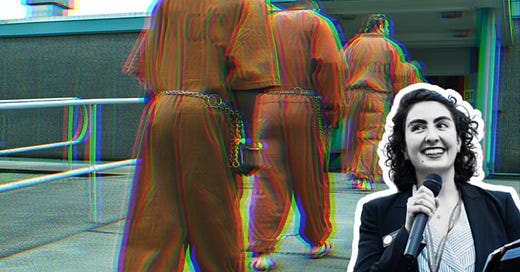Washington lawmakers want to fund political activism in prisons—now with lawsuits for noncompliance
Because the problem with Washington’s prison system is clearly not enough lobbying and lawsuits.
Washington Democrats, led by Rep. Darya Farivar (D-Seattle), are pushing House Bill 1147, a bill that would grant incarcerated individuals the right to engage in political advocacy, form political organizations, and access state resources for civic engagement—all while still serving their sentences.
Supporters claim this will help "rehabilitate" prisoners by allowing them to "participate in democracy." But in reality, it turns prisons into political training grounds, forces taxpayers to fund activism behind bars, and now includes the threat of lawsuits for noncompliance.
If HB 1147 passes, expect:
Inmates forming political organizations and lobbying from within prison walls.
Taxpayer-funded civic engagement programs to "amplify" inmate voices.
An expansion of government-funded political activism disguised as rehabilitation.
Prisons and state agencies facing lawsuits if they don’t comply.
This isn’t about fairness—it’s about giving convicted criminals more political power while law-abiding citizens foot the bill.
What HB 1147 does
HB 1147 mandates that incarcerated individuals have access to state-funded civic engagement opportunities.
Inmates will be allowed to form and participate in political advocacy groups while serving their sentences.
State agencies will be required to facilitate civic engagement activities for inmates, including organizing meetings and providing access to advocacy organizations.
The Office of Equity will oversee and enforce "civic engagement rights" for inmates.
Prison staff will be prohibited from retaliating against inmates for engaging in political activism.
If a person’s right to civic engagement is violated, they can sue for damages—including attorney’s fees—and courts may triple the damage award, up to $25,000.
This means prisons will become taxpayer-funded political hubs, where convicted criminals can organize, lobby, and advocate for policy changes—all while serving time. And if the prison doesn’t comply? It gets sued.
Why this bill is dangerous
It prioritizes criminals over law-abiding citizens
This bill grants inmates privileges that many law-abiding citizens don’t have.
While many working-class Americans struggle to engage in civic activities due to time and financial constraints, prisoners will be given state-funded resources to organize politically.
Victims of crime often feel ignored by the justice system—now their attackers will be given a bigger voice in shaping policies.
Taxpayer dollars should go toward crime prevention and rehabilitation, not creating an activist class inside prisons.
It forces taxpayers to fund political activism in prisons
HB 1147 would require:
State agencies to allocate resources for inmate political advocacy.
Prison facilities to accommodate political organizing activities.
Public employees to facilitate inmate lobbying efforts.
This isn’t about rehabilitation—it’s about creating a pipeline for taxpayer-funded political activism.
It allows inmates to sue the government for "violating" their political rights
Under HB 1147:
If an inmate feels their right to civic engagement was violated, they can sue the state in superior court.
The lawsuit can include damages, attorney’s fees, and a court-ordered injunction against the prison or state agency.
The court can triple the damage award, up to $25,000.
This opens the floodgates for taxpayer-funded lawsuits, draining public resources and further burdening the legal system.
Who benefits from this bill?
Political activist groups looking for a new base of support.
Lawmakers who want to court radical criminal justice reformers.
Bureaucrats who want to expand government-funded political programming.
Trial lawyers who can now file lawsuits on behalf of inmates.
Who doesn’t benefit?
Law-abiding citizens who don’t have the same access to government-funded activism.
Victims of crime who will see criminals given even more influence over the legal system.
Taxpayers who will foot the bill for lobbying efforts they may disagree with and lawsuits against their own government.
This bill isn’t about justice—it’s about expanding political power where it doesn’t belong.
What’s next?
If HB 1147 passes, expect:
A surge of inmate-run political groups lobbying for softer sentences and more lenient laws.
Increased costs as state agencies divert resources toward inmate civic engagement programs.
More taxpayer money funneled into government-backed political activism.
An explosion of lawsuits against the government from inmates claiming their political rights were violated.
This isn’t about rehabilitation—it’s about turning prisons into taxpayer-funded political headquarters with legal backing.
What can you do?
Contact your lawmaker. Tell them no to HB 1147 and yes to keeping political lobbying out of prisons.
Demand accountability for taxpayer-funded activism.
Tell Washington lawmakers to not use your tax dollars to fund political activism in prisons.




